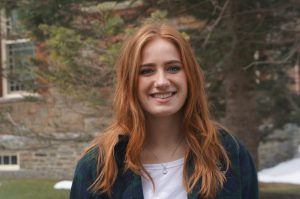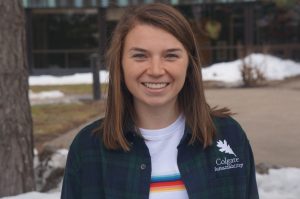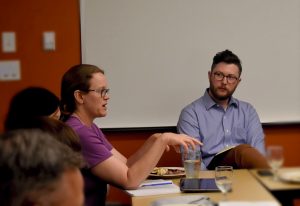Maggie Dunn ‘19

Maggie Dunn comes to us from Greensboro, North Carolina and is majoring in Environmental Geography with a minor in Philosophy. In her free time, she enjoys hanging out with friends, reading, finding new music, cooking, and playing sports. When asked what aspects of sustainability she is most interested in, she replied, “I’m very passionate about water, specifically water conservation, contamination, and ocean health.”
Chaveli Miles ‘19

Chaveli Miles, a passionate Shelburne, Vermonter, first joined us as a Summer 2017 sustainability intern and will be staying on for her first full year with the Office this 2017-2018 academic year. Chaveli enjoys rock climbing, hiking, and following track and field (Usain Bolt is always a fair topic for conversation). Her passions include dogs, coffee, reggae music, the Natural Sciences, and Japanese, Scandinavian, and sustainability-focused interior design.
MaryKathryn McCann ‘18

In a group of already academically diverse students, MaryKathryn McCann, from Chester, New Jersey, stands out above the rest with a major in Biology and a minor in Economics. In her free time, MaryKathryn enjoys going on bike rides, watching sporting events, and going to trivia nights on campus. Her favorite scientific focuses include pharmacological studies and water security.
Seamus Crowley ‘18

Seamus Crowley from Aspen, Colorado, like many of our sustainability interns, majors in Geology and minors in Environmental Studies. He enjoys maintaining an active and engaging lifestyle in his free time, which means running, skiing, and reading are always fair game. As you might guess, Seamus claims environmental advocacy and outdoor sports as some of his greatest passions.
Cecilia Kane ‘20

As one of the youngest of our new interns, Cecilia Kane has not yet declared a major or minor, but has expressed interest in Geography, Spanish, and English as possible fields of study. Cecilia comes to us from Alexandria, Virginia and enjoys playing the piano, practicing photography, painting, and hanging out with her dog and three sisters (specifically in that order). She is passionate about her faith, her family, social justice, and sustainability and the environment.
Chloe Matonis ‘18

Chloe Matonis comes to us from Greenwich, Connecticut and is an Environmental Studies and Chinese double major. In her free time, Chloe likes to spend her time running, reading, cooking, playing ultimate frisbee, and expanding her comedy repertoire. “I am incredibly passionate about environmental protection, of course,” she said. “I would have to say that my ‘hot button’ environmental issue is sustainable agriculture and food security, partially due to the fact that I have been vegetarian since I was 8 years old. I am also very passionate about comedy and making people laugh, which corresponds with my love for languages and meeting new people. I guess all in all, I am a people person looking to help the planet.”
Kimberly Duncan ‘18

Kimberly Duncan, from Charlotte, North Carolina, double majors in Environmental Studies and Studio Art. In her free time, she can usually be found drawing, watching Food Network, working out, eating popcorn, or taking long walks on the beach. Her passions include “communication of environmental issues through visual/artistic aids, environmental education, urban farming, food, my two dogs, and playing volleyball.”
Ashlea Raemer ‘18

Ashlea Raemer comes from Troy, New York and is double majoring in Environmental Studies and Biology. She enjoys crocheting/knitting, shopping second-hand, traipsing around Upstate New York, watching reality TV, and making her own graphic tees. Ashlea proclaims an admirable range of personal passions, including sustainable food systems, conservation, environmental education, naps in the ENST study room, and the search for the perfect french fry.
Isabel Dove ‘19

A Geology major from Collegeville, Pennsylvania, Isabel Dove often loves to hike, play tennis, and knit. She recently took up beekeeping and is president of Colgate’s new Beekeeping Club. Isabel is interested in studying climate change and spent the summer working in a micropaleontology lab. Her passions include learning new things and expanding her horizons by traveling to new places.
Revée Needham ‘18

An Environmental Studies and Geography double major, Revée Needham comes to us from Elko, Minnesota. In her free time, she enjoys reading, dancing, doing yoga, learning to cook new vegan and vegetarian recipes, and laughing at relatable maps. Her interests as they relate to sustainability are often focused on “changing the industrial agricultural system in America to be a more inclusive, diverse, and humane system to the workers, animals, and land. Generally, I’m also interested in making sustainable lifestyles more accessible to all.”
Dana Chan ‘19

All the way from Manila, Philippines, Dana Chan is a junior planning to double major in Neuroscience and Biology. She often enjoys teaching herself to cook new traditional dishes, reading, drawing, and Skyping her dog back home. She is self proclaimed to be *very* passionate about guinea pigs and her doggo, Garfield. “I also like sleeping and anything about neuroscience,” she says. “In terms of sustainability, the topics that interest me the most are sustainable urban planning and food security.”
Delaney Pals ‘18

Delaney Pals, from Wilmette, Illinois, pursues a major in Geography and minor in Economics. She can often be found outdoors partaking in any number of activities, including skiing, running, hiking, or reading. Accordingly, she is very passionate about the outdoors and all aspects of sustainability.
Matthew Froelich ‘19

Matthew Froelich, from Seminole, Oklahoma, has planned an academic career majoring in Geography and minoring in Economics. In his free time, he enjoys keeping active and outdoorsy with activities such as hiking, skiing, and rock climbing. Apart from enjoying the great outdoors, Matthew loves to take long road trips, play piano, and binge-watch Parks and Rec.
Madison Smith ‘19

Madison Smith comes to us from the quiet streets of New Boston, New Hampshire, and plans to focus her time here at Colgate studying Environmental Studies and Economics. Some of her favorite pastimes include hiking, kayaking, bike riding, working out, reading, and enjoying a good meal. Madison is a passionate defender of sustainable lifestyles and has an interest in many aspects of sustainability; she is a firm defender of animal rights, vegetarian/vegan diets, environmental justice for marginalized groups around the world, and pushing for sustainable, consumer-friendly alternatives in the corporate sphere.
Julia Feikens ‘18

Julia Feikens hails from West Nyack, New York and is majoring in Environmental Geography. She often can be found taking a few laps in the gym pool, enjoying a nature walk on one of Colgate’s many beautiful trails, or sketching the scenery around her. Her greatest passions include marine ecosystems, geography, music, and art.
Dana Monz ‘18

An Environmental Studies major and Political Science minor, Dana Monz joins us this year from North Haven, Connecticut. One of Dana’s greatest passions is the outdoors; during her free time she enjoys running, skiing, enjoying her natural surroundings, and spending time with her dog, Bryce.
Makenna Bridge ‘20

One of our youngest members, Makenna Bridge is a long-time local, hailing from Madison, New York. She plans to focus her studies here at Colgate on a diverse variety of fields of study, with the ultimate goal of double majoring in Spanish and Environmental Studies. In her free time, Mak enjoys spending as much time outdoors as she can manage: hiking, gardening, exploring Colgate’s forests, and spending time with her dog (one of her greatest passions). With regards to sustainability, Mak is interested in environmental conservation and advocacy as well as food and agriculture.
Miranda Gilgore ‘18

Another relative local, Miranda Gilgore joins us from Scotia, New York, where she enjoys getting outside, visiting new places, researching sustainable living practices, and trying out new and exciting recipes. She is pursuing a double major in Environmental Geography and German, which she intends to put to use in exploring her passions, landfill waste management and advocacy.
Shawn Palmer ’20

A sophomore from Skaneateles, NY, Shawn Palmer is in charge of managing the Office of Sustainability’s Green Bikes program. Shawn has not yet declared a major, but is interested in Environmental Studies. Consistent with his positions the Green Bikes intern, Shawn loves to ride all things 2-wheeled and is passionate about the great outdoors.




